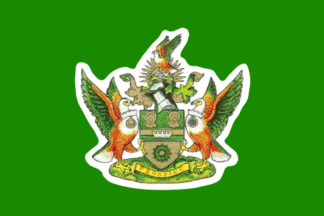lka.jpg) image sent by Bruce Berry, 09 Sept 2018
image sent by Bruce Berry, 09 Sept 2018
Last modified: 2019-08-06 by bruce berry
Keywords: lusaka | zambia |
Links: FOTW homepage |
search |
disclaimer and copyright |
write us |
mirrors
 image
by Tomislav Šipek, 30 July 2018
See also:
image
by Tomislav Šipek, 30 July 2018
See also:
Lusaka is the capital and largest city in Zambia. It is
located in the southern part of the central plateau and was established in 1905
by the European (mainly British) settlers. In 1935, due to its more
central location and its situation on the railway and at the crossroads of the
Great North and Great East Roads, it was chosen to replace Livingstone as the
capital of the then British colony of Northern Rhodesia. It became a municipality in 1954 and was subsequently elevated to the status of a city. As the national capital, Lusaka is the seat of the legislative, executive and judicial branches of government, epitomized by the presence of the National Assembly (parliament), the State House (office of the President), and the High Court. It is also the main commercial centre of the country and has a rapidly growing population.
Tomislav Šipek, 30 July 2018
The municipal flag of Lusaka has a green field with the
municipal coat of arms in colour in the centre.
Tomislav Šipek, 30 July 2018
lka.jpg) image sent by Bruce Berry, 09 Sept 2018
image sent by Bruce Berry, 09 Sept 2018
The coat of arms were granted by the English King-of-Arms by Letters Patent on 30 March 1955 with the following blazon:
Arms:
Per fess Vert and Or on a fess per fess counterchanged between in chief two
garbs Gold and in base a cog-wheel Sable a mural crown Argent.
Crest: On a
wreath Or and Vert, in front of a rising sun Or standing on a mount Vert charged
with a fountain an African Fish Eagle wings elevated and addorsed proper.
Mantling: Vert doubled Or.
Motto:
Prospice (Look to the Future).
Supporters: On either side an African Fish Eagle wings
elevated and addorsed proper gorged with a mural crown Argent pendent there from
a roundel that on the dexter Vert charged with a garb Or that in the sinister
Gold charged with a cog-wheel Sable.
The golden sheaves and the green background symbolises agriculture, and refer
specifically to the extensive farming activities which occur in the area.
The industrial importance of the city is indicated by the black cog-wheel, the
golden background alluding to the wealth derived from industry. The silver
mural crown placed in the centre of the shield is an allusion to civic
authority. The crest is formed of an African Fish Eagle, which is found
throughout the country and is also depicted on the national arms and
flag, standing in front of a rising sun symbolic of
progress and expansion. The fountain alludes to the abundant water supply
in the area. The supporters have no special significance beyond the fact
that the Fish Eagle is ubiquitous in Zambia.
Bruce Berry, 09 Sept 2018